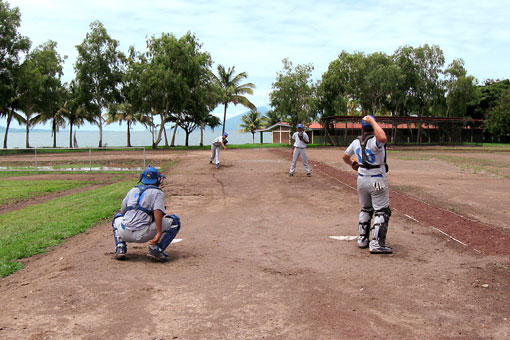The Dominican Republic and Nicaragua are roughly comparable in population and share an equally deep passion for baseball. But the Dominican Republic has sent well over 100 players to Major League Baseball (MLB) teams, while Nicaragua counts only three big-time players.
Nicaragua is looking to change that disparity. And the first step in achieving that may have come early this year with the opening of the Nicaraguan Baseball Academy. Dennis Martínez, who in 1976 became the first Nicaraguan to make it to the majors, is helping to lead this effort to train aspiring major leaguers with the skills necessary to attract attention from scouts.
Success will not only boost a new generation of Nicaraguan players, but inject some needed cash into the country’s economy—judging by the example of the Dominican Republic.
In the Dominican Republic, pitchers, hitters and fielders are major export commodities, earning serious foreign exchange for the country and massive remittances for the athletes’ families. The fame of Dominican superstars like David Ortiz, Robinson Canó and Sammy Sosa (before his steroids scandal) fill MLB stadiums and also help boost tourism—a major growth industry—to their homeland.
Just as important, baseball has been the path out of poverty for thousands of Dominican youth—a healthy and lucrative alternative to dangerous careers in gangs and crime.
Nicaragua’s Martínez, who in 1991 became the only Latin American-born pitcher to throw a perfect game, is betting that Nicaraguan youth—like their Dominican counterparts—have the talent and ambition to succeed in MLB. The challenge had been developing the proper business model.
So Martínez teamed up with two Nicaraguan investors and a professional U.S. baseball operator, Gary Wendt, to open the Nicaraguan Baseball Academy with the goal of securing an initial $1 million investment. A quiet resort that Martínez owns on the shores of Lake Nicaragua—with two majestic volcanoes as a backdrop—now serves as the academy’s barracks and playing field. In its first year, 33 players between the ages of 14 and 18 were selected from tryouts across the country to enter the academy.
The business model is based on the signing bonus system developed in the Dominican Republic. Following this example, the Nicaraguan Academy will intensively train teenagers, free of charge, for nine months in the expectation that MLB scouts will be sufficiently impressed to offer perhaps a third of the aspiring athletes a contract to join their minor league systems. The academy will pocket one-third of the signing bonus—enough, with luck, to cover all its costs and generate a profit for the investors.
The academy’s owners do not imagine that, overnight, Nicaraguan talent will be able to compete head-to-head with Dominicans or other primary sources of MLB talent such as Puerto Ricans and Venezuelans. To break into an already well-developed market, Nicaragua will have to enter with a low-cost model. Operating costs will be kept to a minimum and the players will—it is projected—receive signing bonuses that are attractive for Nicaraguan youth but modest for Dominicans accustomed to million-dollar contracts.
The Dominican farm system serves as the academy’s model of what does and does not work. Pablo Paredes, a native of the Dominican Republic and former minor league catcher, is a member of the core operating staff and brings his years of experience as a coach. He knows the Dominican farm system intimately and plans to apply its methods of training young talent, including drills in technique and developing the competitive spirit and mental toughness that turn young players into pros…





